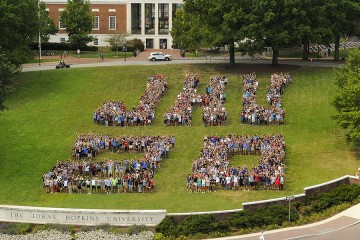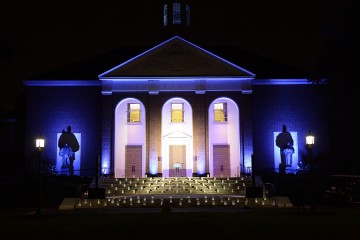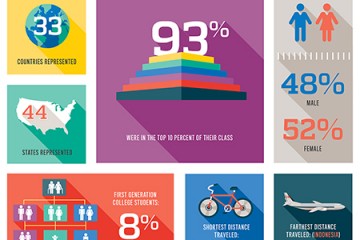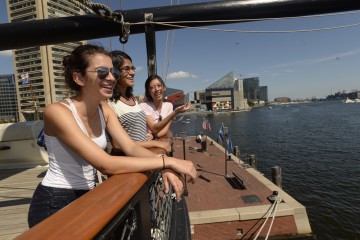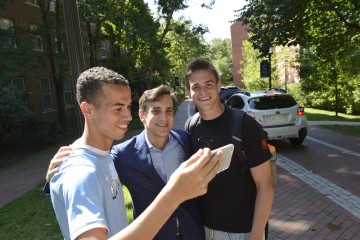Student leaders, faculty, and staff were the first to formally greet the Johns Hopkins University Class of 2020 at the convocation ceremony Wednesday night.
After a pre-convocation dinner on Freshman Quad, Homewood's newest Blue Jays formed a more than 1,300-person line and made their way to Ralph S. O'Connor Recreation Center.
The students posed for group selfies in semi-formal attire as they waited to take their seats. University faculty followed in a processional led by deans from the Krieger School of Arts and Sciences and the Whiting School of Engineering.
Sunil Kumar, the university's new provost and the convocation's chief marshal, brought the ceremony to order.
Then began a plethora of advice from the school's leaders to the newest members of the JHU family.
Carissa Zukowski, major events coordinator for the new student orientation CORE Team, reminded her fellow undergraduates that everyone in the room would provide the class with support.
"You may face certain obstacles that, upon first glance, seem insurmountable," she said. "It is in these moments that I welcome you to turn to a friend, to a floor mate, to a professor, really to anybody, and utter three magical, life-changing words: 'I need help,'"
Student Government Association President Charlotte Nell Green described a unique hiking experience will a professor, right in JHU's backyard. The hike, which she said she almost did not attend, showed Green how dedicated the faculty is to students' learning.
In presenting the Class of 2020, David M. Phillips, vice provost for admissions and financial aid, remarked on the group's impressive characteristics and achievements. He mentioned that 85 percent were involved in community service, 88 percent were student-athletes, and nearly a third of the class expressed a deep fascination with other cultures.
"You set the academic bar higher than any class in Johns Hopkins history," Phillips said.
President Ronald J. Daniels challenged the new class to see the world clearly despite inevitable distractions, bias, or blindness. He used the work of Bloomberg Distinguished Professor Alan Yuille, a foremost expert in computer vision, to describe how difficult it is to see clearly, even for computers.
"To see clearly is as big a challenge in the very human world of ideas as it is in the world of computer vision," Daniels said.
"We can be misdirected by inputs—data, social influences, commands to view things in a certain way—that blind us from seeing something very different, something that in hindsight was, and always should have been, crystal clear. "
Daniels gave the example of marriage equality. In 2003, LGBTQ sexuality was considered a criminal act in many states. But U.S. Supreme Court Justice Anthony Kennedy declared the laws to be unconstitutional. This act arguably began the path toward the 2015 Supreme Court decision to make same-sex marriage legal in all 50 states.
"Times can blind us," Daniels said. "Tomorrow, you will formally enter into an academic community that is fundamentally dedicated to seeing the world in all its vast richness and complexity."
In closing, the president encouraged the new students to be vigilant. He asked that they recognize their blind spots and see disparities in the world that are often hidden in plain sight.
"You arrive at Hopkins with an understanding that the world is a diverse and complex place that does not afford simple answers," Daniels said. "You come here with a passion to investigate and explore. And you will find here encouragement not to be blinded by past or present as you forge your own path forward."
"Whatever your path, we see you as part of us."
Daniels' complete remarks are below:
Thank you, Vice Provost Phillips. And thank you to our entire orientation team for their work in getting you here and to the Sirens, the All-Nighters, and the Archipelago project for the soundtrack to tonight's festivities.
Welcome to the parents, siblings and friends who are watching from around the world.
Welcome to our transfer students—we applaud your choice!
And, of course, welcome to the great Class of 2020!
I have a question for you: Ever think you are seeing things?
I know you've probably already seen things here. (Shows image of Pokémon character, Squirtle, outside of Levering Hall)
I'm not actually going to devote my time tonight to talk about the merits—and hazards—of Pokémon Go. Student Affairs has that covered.
What I want to talk about is how we see our world.
I know classes don't start until tomorrow, but I'd like to give you a quick pop test.
Here it is. Here's a pop quiz: Watch closely this bit of magic brought to you by experimental psychologist (and magician) Richard Wiseman. (Shows video of Richard Wiseman color-changing card trick)
Isn't that amazing! This is just the beginning of the magic you will see at Johns Hopkins.
Okay. Simple. The card changed color, right?
But wait for it. Here's what you actually saw. (Shows video of color-changing card trick revealed)
Now, some of you may have noticed all those changes—the table cloth, the back drop, and the two shirt changes—but you would be in the minority.
The question of how we see what we see came up the other day when I sat down with Dr. Alan Yuille.
To put Alan in the context of your Hopkins journey, he is a Hopkins Bloomberg Distinguished Professor, who started out as a mathematician and who studied with renowned theoretical physicist Stephen Hawking before becoming one of the world's foremost experts on computer vision.
Computer vision is one of the fields that has brought us extraordinary things like face-recognition software and self-driving cars.
Alan and others have spent the past 40 years decoding the complexity of vision and figuring out how to get computers to see. As Alan likes to say, vision is hard, even for humans who are uniquely visual animals.
Vision is that much harder for computers. They use, in some cases, 50 times the power of the human brain and take exponentially more time to decipher even a part of an image. And they still can be fooled.
Alan demonstrates this in his lectures as follows. We humans can recognize a penguin. (Show picture of penguin)
We also know that this is a penguin with a TV. (Shows picture of penguin with TV)
But ask a computer network and it will tell you the penguin is a human. Just because you added a TV. I won't speculate on what that says about humans.
You may be wondering: Why bring this up at your convocation?
For the following reason: To see clearly is as big a challenge in the very human world of ideas as it is in the world of computer vision.
We do not generally confuse a human with a penguin lurking behind a TV.
Yet we can be misdirected by inputs—data, social influences, commands to view things in a certain way—that blind us from seeing something very different, something that in hindsight was, and always should have been, crystal clear.
We may indeed be blind, or distracted, or biased.
We may be operating with less than complete information or conceiving of a problem in a way that makes it difficult to move towards an obvious solution.
Learning to see the full picture is not easy.
Consider one of the great issues of social justice in our era: marriage equality. It seems hard to believe that same-sex marriages were not legally recognized just a few years ago.
But, look at how rapidly the social and legal landscape has changed.
Let's go back to 2003, the year many of you were in kindergarten. I know that may seem like ancient history to you, but it's just yesterday to your parents. Back then, there were still laws on the books in many states that declared LGBTQ sexuality a criminal act. That year, in a Supreme Court opinion, Justice Anthony Kennedy declared these laws to be unconstitutional. He wrote, "Times can blind us to certain truths and later generations can see that laws once thought necessary and proper in fact serve only to oppress." With this, the Court declared that LGBTQ people had the right to live their private lives fully, beginning the inexorable progress toward marriage equality across the nation.
Times can blind us.
Of course, it is insufficient to leave it at that. Indeed, Justice Kennedy did not.
He stated unequivocally that the decision to criminalize the intimate lives of LGBTQ people is, and always was, wrong. The fact that our times can blind us does not serve as an excuse for moral relativism or give a pass to those who would curtail others' freedoms.
So the question is: What are the tools one needs in order to learn to see clearly and with the necessary degree of complexity?
Here's where the convocation part comes in.
Tomorrow, you will enter formally into an academic community that is fundamentally dedicated to seeing the world in all its richness and complexity.
We are a community committed to addressing our world's most pressing concerns by taking in as many inputs, ideas, facts as possible in order to formulate good and robust, humane and workable solutions. We break down our most commanding questions into their constituent parts in order to recompose them into a more complete, more nuanced, more dynamic picture than what was there before.
In doing so, we answer the call to be vigilant.
To recognize our own blind spots, individually and as a community.
To challenge ourselves to see the disparities that – too often and for far too many – hide in plain sight.
To embrace open and rigorous debate informed by evidence and enriched by many viewpoints, some of which may challenge our own knowledge in profound, even unsettling ways.
This climate, this sensibility is essence of a great university.
This is the work of our our statesmen-researchers and economists, who grapple with the fate of the Middle East.
This is the aim of our sociologists and data scientists who seek to change the arc of our cities and the lives of our neighbors after years of entrenched and devastating inequities.
This is the passion of our scientists and clinicians, who illuminate how our immune systems can be harnessed to eradicate cancer, or those, like Alan Yuille, who help us all to see more clearly.
Alan, we're delighted you are here with us tonight. We thought the students might like to meet you.
Of course, what we see—with no difficulty at all—is that each of you share this spirit of inquiry.
You arrive at Hopkins with an understanding that the world is a diverse and complex place that does not afford simple answers. You come here with a passion to investigate and explore. And you will find here encouragement not to be blinded by past or present as you forge your own path forward.
Along the way, you may find yourself confronting sights you could not have imagined, moving away from a crystal clear vision of your world.
This may take the form of a particularly challenging critique on your first film, an unexpected encounter with a community member during an internship, or a friendship with a person on your hall at the AMRs that quite literally changes the trajectory of your life.
Whatever your path, we see you as part of us.
Part of building a more just and vibrant future, one we may not yet see in its full brilliance, but which you will help bring into focus in the years ahead, on our campus and in our world.
We are truly thrilled that you are here.
Class of 2020, welcome to the Johns Hopkins family!
Bon voyage!
Posted in University News, Student Life
Tagged class of 2020




